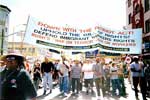
ILWU to Shut Down West Coast Ports May 1 to Protest War
(March 2008).
click on photo for article
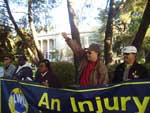
Militant Protest Against Racist Cop
Attack on Bay Area Longshore Workers (October 2007).
click
on photo for article
May 2008
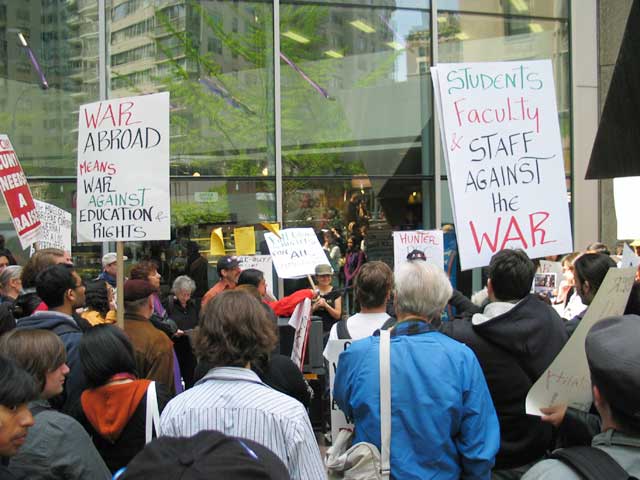
Teach-in/rally at Hunter College in New York in solidarity with ILWU port shutdown.
Photos of Hunter rally by David Pavlosky.
The following article is based on a report by a PSC delegate and supporter of the Internationalist Group.
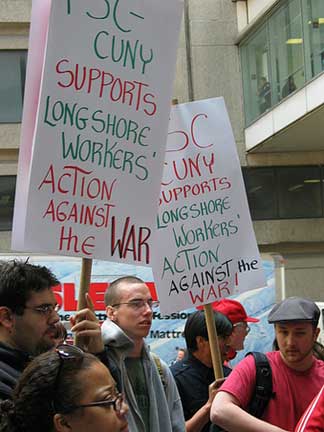 The
May 1 West Coast port shutdown against the war by the International
Longshore
and Warehouse Union (ILWU) had an impact in New York City. The dock
workers’
defiant action demanding immediate withdrawal of U.S. troops from the
Near East
was an inspiration to workers, students and all opponents of
imperialist war –
as well as an example to emulate.
The
May 1 West Coast port shutdown against the war by the International
Longshore
and Warehouse Union (ILWU) had an impact in New York City. The dock
workers’
defiant action demanding immediate withdrawal of U.S. troops from the
Near East
was an inspiration to workers, students and all opponents of
imperialist war –
as well as an example to emulate.
May
Day events in solidarity with the ILWU action were held on eleven
campuses of
the City University of New York (CUNY) by chapters of the Professional
Staff
Congress (PSC), the union representing CUNY faculty and staff. These
included
rallies and teach-ins at Hunter College, Hostos Community College and
Bronx
Community College, a speak-out against military recruiters at Queens
College, a
march into Manhattan from NY City Tech, and tabling at several other
units of
the largest urban public university in the United States.
At
Hunter College, preparations had been underway for weeks, with
beautiful
posters, signs and more than 1,500 leaflets distributed by faculty and
students
as well as immigrant-rights activists and cab drivers who came to help
out. The
Hunter student newspaper, The Envoy, ran an extensive article,
“PSC
Supports Dock Workers’ Strike on May Day to End War,” quoting history
professor
Sándor John, who noted that the working class has “a power that
can shut down
the whole country,” which is “much stronger than 10,000 marches or
rallies.”
John
pointed out that the PSC’s support for the dock workers’ historic
action
against the war on Iraq and Afghanistan is “very strongly connected to
building
a strong union and our ability to fight for anything.” Film professor
Tami
Gold, a noted documentary filmmaker and incoming chair of the Hunter
PSC
chapter, pointed out that faculty pay at CUNY had fallen by 27 to 51
percent in
recent years as salaries failed to keep up with inflation. The PSC has
been
working without a contract since last September, while adjuncts
continue to get
poverty-level pay.
The Hunter rally drew support from labor and
immigrant groups that sought a concrete way to express solidarity with
the longshore workers’ port shutdown. In addition to the New York
Taxi Workers Alliance (a largely immigrant group that carried out an
important strike last fall), the event was endorsed by NYC Labor
Against the War, UFTers Against the War, New Immigrant Community
Empowerment and others.
Organizers
at Hunter had to contend with vindictive campus administrators who told
police
to deny a sound permit for the outdoor rally/teach-in. They even sent
cops to prevent
use of a bullhorn. Police barricades deterred some from joining in,
although
scores crowded into the plaza to hear and participate. Altogether about
120
people attended. Students responded with vigor to joining with the
power of
labor on the international workers day, particularly this May Day as
the first
labor strike against war in U.S. history was being carried out.
“Workers
strikes against the war!” the crowd chanted. Several reports were
relayed
during the three-hour event from the West Coast dock workers’ port
shutdown and
march in San Francisco. Outgoing Hunter PSC chapter chair Mike Perna
read a
lyrical description of the different West Coast ports that had been
closed by
union action. PSC vice president Marcia Newfeld read a letter from
Iraqi dock
workers announcing their shutdown of two ports in solidarity with the
ILWU
action and against colonial occupation.
Participants
got a history lesson on the 1934 San Francisco general strike that
established
the ILWU, about the police murder of three unionists in their attempt
to break
the longshore strike, on the union hiring hall that has enabled the
West Coast
dock union to stand strong against racism, xenophobia and McCarthyite
witchhunting against “reds on the docks.” The
ILWU’s refusal to load ships for the Chilean
dictatorship, the
Salvadoran junta and South African apartheid butchers was cited.
The
history of May Day was recalled going back to the judicial frame-up and
execution of the Haymarket martyrs, in an attempt to break the 1886
strike by
tens of thousands of immigrant and U.S.-born workers fighting for the
eight-hour day. This was linked to recent events, particularly the
acquittal of
the NYPD killer cops who gunned down Sean Bell in a hail of 50 bullets
on his
wedding day in Queens.
There
were faculty speakers from the Anthropology, English, History, Media
Studies,
Philosophy, Sociology, Romance Languages, Urban Planning, Women’s
Studies and
other departments at Hunter. Speakers told of the role students played
in the
1968 Columbia University revolt and in the May-June ’68 worker/student
revolt
in France on the 40th anniversary of those events. A professor from
Brooklyn
College gave some history of the Iraq war, and drew lessons from the
workers’
revolt against World War I in Germany.
Carl
Lindskoog, an organizer of the Adjunct Project, received loud applause
when he
said we don’t oppose this war because it “costs too much” to kill
Iraqis and
Afghanis, but because it is a war of conquest, pillage and plunder. He
gave a
rousing appeal to learn from the dock workers not to be intimidated by
anti-labor legislation like New York’s Taylor Law, which bans strikes
by public
employees. “The dock workers shut it down, and we need to do that,
too,” he
said to chants of “Shut it down, shut it down.”
A
representative of the New York Metro Area Postal Union told of the
solidarity
with the ILWU antiwar port shutdown by postal unions here and in other
cities.
A speaker from the Welfare Rights Initiative linked organizing among
welfare
recipients to the struggle for women’s rights, to defend public
education and
against the war.
A central theme
was the fight for immigrants’
rights, particularly as immigrants mobilized around the country on May
Day.
Antonio, a rank-and-file member of the Taxi Workers Alliance and
supporter of
the Internationalist Group, told the Hunter rally: “The attack on
immigrants
also means attacks on workers born here. Look at what they’re doing
with
driver’s licenses and the push for a national ID card. As an immigrant
worker,
I link the struggle for full citizenship rights for all immigrants to
the fight
for labor rights and to the fight to defeat imperialist war. I link it
to the
fight against the oppression of black people in this country, which is
key to
the class struggle. We see it in the Sean Bell case, and in the fight
to free
Mumia Abu-Jamal,” the radical black journalist and former Black Panther
on
Pennsylvania’s death row.
There
was controversy as well. One professor said speakers were too hard on
the
Democratic Party, while another urged rally participants not to engaged
in
“sectarian radical approaches.” The rally chairman responded with
examples of
how both Republicans and Democrats had used the anti-labor Taft-Hartley
and
Taylor laws against labor, speaking of the 2005 NYC transit strike,
about
Democratic president Bill Clinton’s ending of “welfare as we know it,”
as well
as his attacks on the right of habeas corpus, of the votes for the war
budget
of candidates Hillary Clinton and Barack Obama. A philosophy adjunct
professor
spoke about how imperialism works.
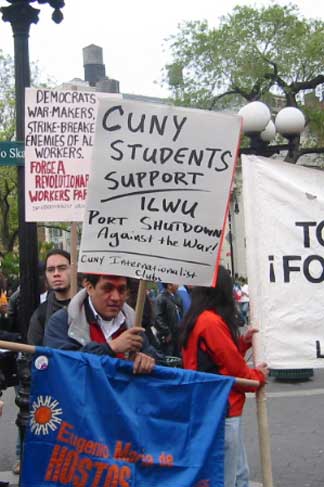 Internationalist photo
Internationalist photo
A
speaker from the Internationalist Group talked of how the “official
antiwar
movement” had been powerless to stop the war, since marches and
protests “don’t
stop the tanks from rolling, or war materiel from being shipped.” “Wars
are not
started or stopped by public demand,” he said, “despite the strategy of
endlessly pressuring Democrats and Republicans who already know – and
don’t
care – that the public hates the war. Instead what’s needed is to
mobilize real
power, that of the working class.”
A
speaker from the Campus Antiwar Network talked about the effects of the
war on
CUNY, and the activities of her group on different campuses. This led
to a
discussion about the protests that halted the “anti-immigrant war
purge” that
CUNY launched in the fall of 2001, about the struggle that spiked a
“Homeland
Security” certificate program at BMCC, and the campaign by the
Revolutionary
Reconstruction Club at Bronx Community College that managed to
successively
drive Air Force, Navy and Army recruiters off campus by mobilizing
student and
worker protest. There were chants of “Military recruiters out of CUNY!”
Mid-way
through the Hunter rally, protesters were joined by a group that had
come from
the solidarity rally at Hostos Community College in the Bronx. There,
the
speaker from the Hostos Internationalist Club spoke of the USA PATRIOT
Act, of
the police murder of Sean Bell, and of the “migra persecution of
hundreds of thousands of immigrant workers and their families, carrying
out
raids in their homes and workplaces with semi-automatic weapons,
sniffing dogs,
helicopters and an arsenal that would make Rambo blush.” The speaker
noted that
the wave of anti-immigrant laws began under Clinton, calling to break
with the
Democrats and form a revolutionary workers party.
At
the end of the event, a contingent from the Hunter rally proceed to
Union
Square where immigrants’ rights demonstrators were gathering for a
march of
1,000-plus protestors to the Federal Building in Lower Manhattan. Among
the
speakers was Victor Toro, the Chilean leftist émigré who
is
facing deportation. The
Internationalist Group and CUNY Internationalist Clubs carried banners
calling
in Spanish and English for full citizenship rights for all immigrants,
and to
smash the racist Minuteman vigilantes. The contingent chanted “¡Arriba, abajo, la migra pa’l carajo!”
“1-2-3-4,
for workers strikes against the war,” “50 shots equals murder” and “We
are all
Sean Bell, NYPD go to hell.” And finally, “Asian, Latin, black and
white, Workers
of the world, unite!”
With
the mobilization of immigrant workers and the powerful action of the
West Coast
longshore workers, May Day is being reclaimed for the U.S. working
class. Now
we must carry out the promise of international class struggle that it
stands
for. ■
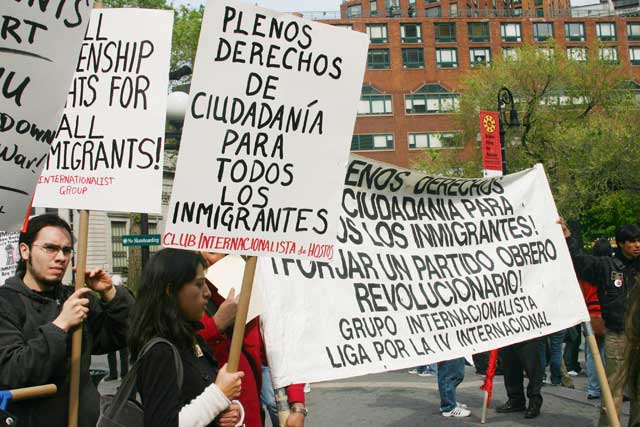
Photo by Nick Cruz